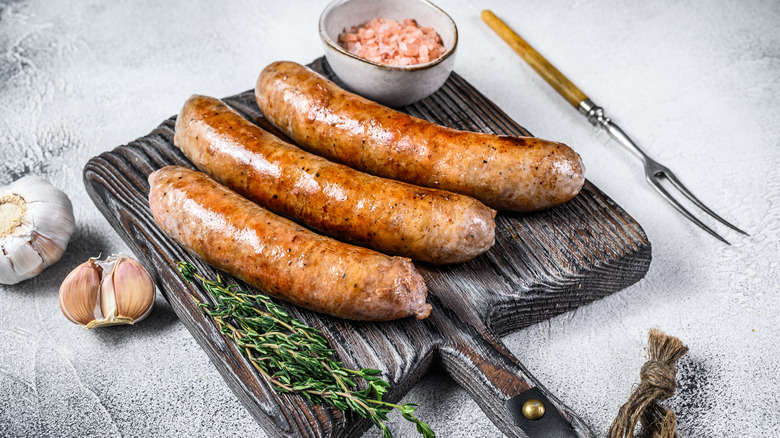The Sneaky Detail You Should Look For When Buying Chicken Sausage
No matter how they're made, sausages are big business. Last year, Americans ate about 1.2 billion pounds of sausages, spending about $5.3 billion (via National Hot Dog and Sausage Council).
Many of our favorite types of sausages, from Spanish chorizo to Cajun andouille, are made from pork. And while leaner cuts like tenderloin are best to serve on their own, fattier — and less expensive — cuts like shoulder are best for sausage-making. The folks at Denver craft sausage company Il Porcellino put the importance of fat simply: "Because it's delicious and provides flavor."
Sausages don't have to be made from pork, though, and chicken sausages have long been gaining popularity. As far back as 2012, the growth in sales of chicken sausages outpaced traditional pork (via Meat+Poultry). For one, chicken sausages tend to be better for you — some of the best chicken sausage brands are higher in protein and lower in fat. And two, billions of people don't eat pork around the world, often for religious reasons.
But next time you're buying chicken sausages, be sure to look closely because a crucial fact can fly under the radar: Some chicken sausages are still made with pork casings.
Why would a chicken sausage use a pork casing?
Sausages have been made since ancient times, primarily as a way to preserve meat. Every part of a slaughtered animal had to be used. Various sausage-like recipes from the Roman culinary text "Apicius" call for ingredients such as liver, brain, and skin. These less desirable portions were stuffed into the animal's intestines to preserve them.
Many modern sausage recipes honor this ancient tradition by using natural casings, which are still derived from a portion of an animal's intestine — perhaps an ingredient in your hot dog that's surprising. But there's a reason the time-honored practice continues; Butchers say natural casings give sausages a better "snap" when you bite into them.
Casings that aren't made from animal organs are typically called artificial or synthetic casings, but that doesn't necessarily mean they're pork-free or even vegetarian at all. A common ingredient in synthetic casings is collagen, a structure-building protein that's abundant in all animals, including the hog intestines used to make natural casings. Many producers extract this collagen from beef hides. On the other hand, some synthetic casings are made from a fibrous plant material called cellulose, though these are not edible and can be peeled off when cooked.
So if you're trying to avoid pork, simply buying chicken sausages might not be enough. Be sure to check the package carefully so you don't accidentally bring home the bacon — nor make any other common food label mistakes.

